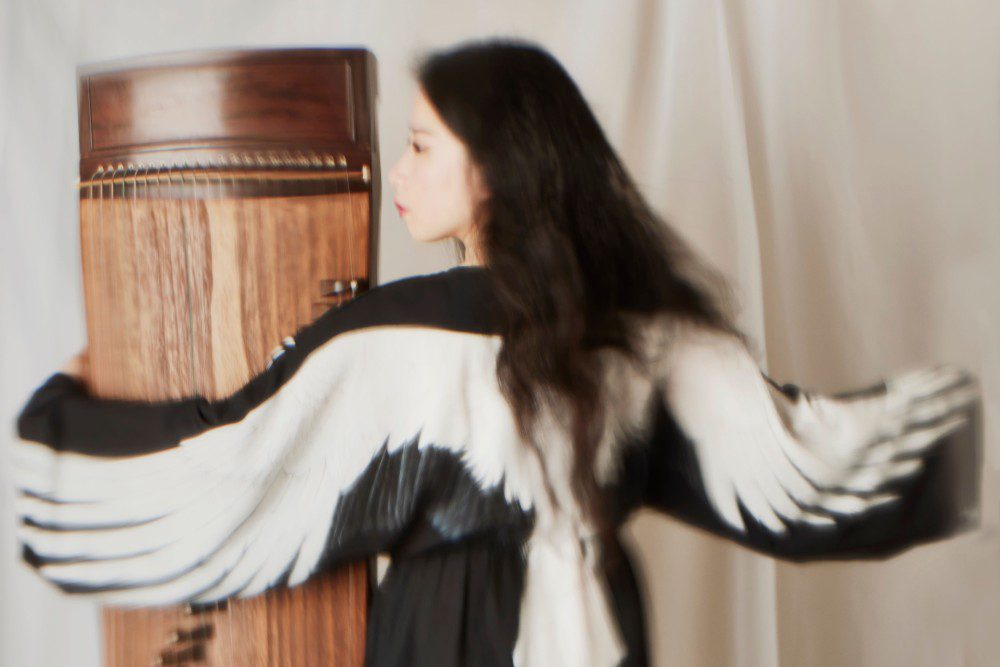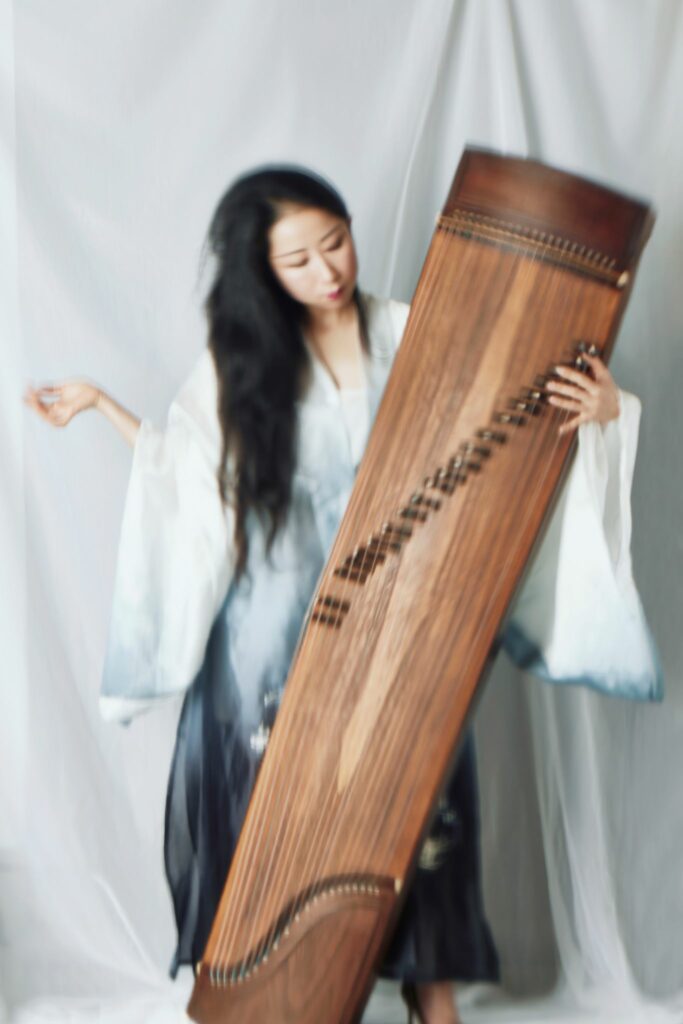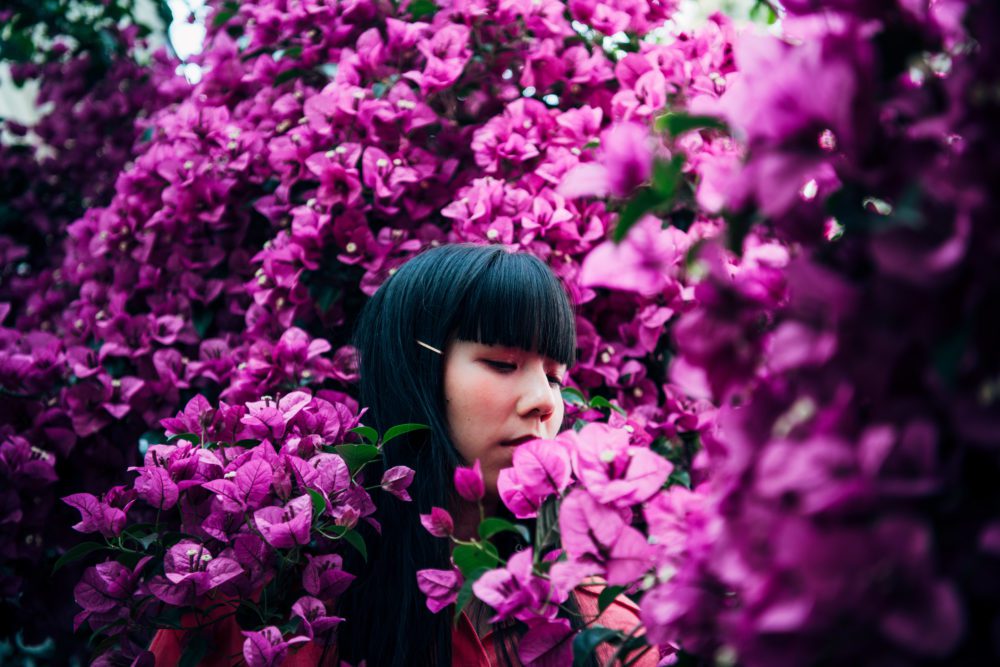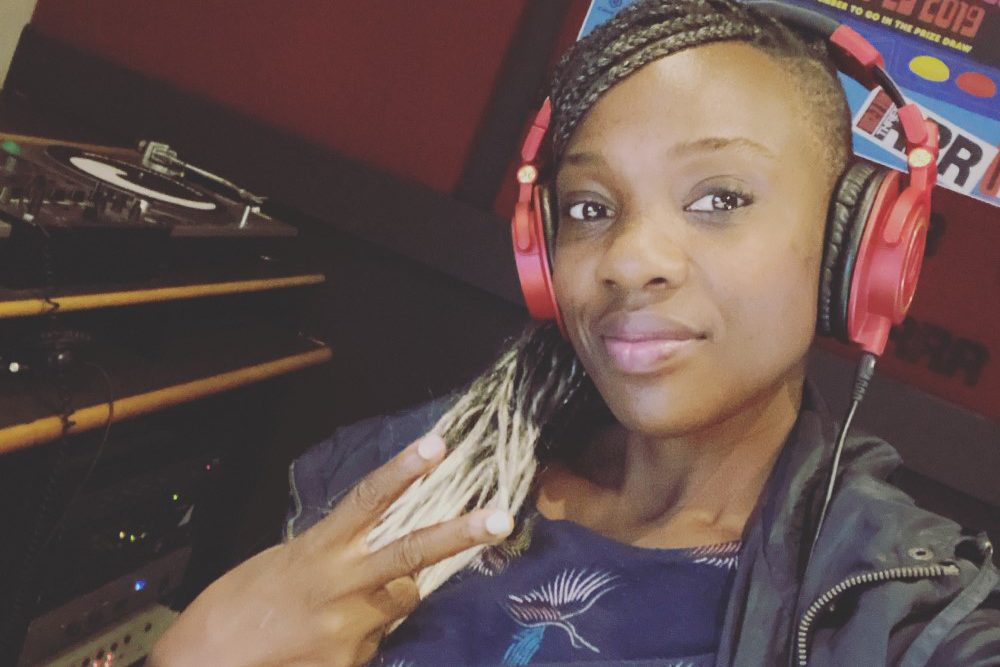

Mindy Meng Wang is not interested in living in a time warp. She is confidently, elegantly weaving traditional instrumentation into a contemporary soundscape to reveal new possibilities for ancient tools. Chinese born, the Melbourne-based Wang is an internationally renowned composer and expert in the Chinese horizontal harp, or guzheng. On her latest album Phoenix Rising, released September 24, she has collaborated with some of Australia’s most renowned modern songwriters and composers, including jazz master Paul Grabowsky, Violent Femmes’ bassist and Dark MOFO founder Brian Ritchie, and orchestral percussionist Claire Edwardes. Lesser known in the mainstream scene, but just as prolific and fascinating, are collaborators Ma Haiping, a Chinese producer and techno DJ, Vietnamese-Australian pianist and experimental electronica composer Fia Fiell (real name Carolyn Schofield), and multimedia composer and performer Daniel Jenatsch.
Phoenix Rising emerged from the collaborative Flash Forward project, in which the Victorian State Government and the City of Melbourne provided funding to 40 musical acts to create original albums within three months. Melbourne-based vinyl producer Heavy Machinery Records and Music in Exile cooperated to release the album, and it is utterly captivating.
“This album really summed up all the styles I’ve been working on the last couple of years,” says Wang. “All the styles I explored in there are things I’m really passionate about. The music I really love to listen to usually is very intense, very emotional. All genres have this, from a really deep cello in classical music to the build-up in electronic, to pop even. It’s more about the emotional style – I really enjoy when you listen to music that wakes up that deep emotion in your heart.”
Hauntingly, heart-achingly lovely “Night Storm” opens the album; Grabowsky’s glassy, cascading piano tumbles upon tumultuous, dark waves, echoing and seeming to glisten under a half-hidden moon. The weighty, atmospheric guzheng is at first blunt and uncertain, then it becomes delicate, tip-toeing tentatively through the curtain of night to reach a midnight rendezvous with the now rumbling, swarthy piano. The two instruments encircle each other in a beguiling call and response, eventually so entwined that there is only their shared song.
“For this album, there’s not a lot of surprises because I’d worked with everyone before,” says Wang. “Individually, they did surprise me though. A lot of the pieces were created via structured improvisation, so I had an idea for the kind of quality it would be, but I didn’t know exactly what it would sound like. I have to say, all the pieces worked in a surprisingly good way.”
In introducing the guzheng into Western musical genres over the last decade, Wang is a pioneer. The instrument had been played in traditional form for 2500 years in China. In finding ways to merge it with jazz, pop, electronica and Western orchestras, she had to experiment with new techniques and tuning systems on the guzheng, resulting in entirely novel sounds. Her curious spirit was likely nurtured by the progressive city she was raised in.
“I was born in a city in Northwestern China, Lanzhou. It was a trading spot on the Silk Road, so everyone came there from India or Europe, even. The Chinese would travel from the capital to here. So, the culture is really mixed and the people are diverse. We have more than 40 ethnic groups living in the city, and that’s where I grew up,” she explains.
That same dichotomy of diversity and unity is reflected in the selection of songs here. Each song, like the first, is deeply atmospheric, conjuring dream visions and glimpses of a landscape that may be real or imagined. It was Wang’s vision to seduce the imagination of her listeners, to glide through their defensive barriers and prejudices and let her music speak for itself. She wanted listeners to discover the guzheng and be moved by it without needing to name it or know it, just as she discovered it as a child.
“My generation is the generation where parents decided that children needed to do something more than just go to school. So, we had to choose a class after school and I chose music,” Wang remembers. “I just happened to have the best teacher in the city as my neighbour, so from a very young age, maybe five years old, I was well looked after by this guzheng teacher. I always loved the sound of her music. When they asked me what music I want to learn, I pointed to her and said that’s what I want to learn.”

Between the ages of six and nine, Wang grew increasingly serious about her playing – there was a lot of training, exams and competitions. At sixteen, she had competed in all the provincial and national competitions. “I thought I’d go to a conservatory and follow this career path, becoming like my teacher,” Wang says. “But then I had the opportunity to go to England for a short-term English course.” That was on 2002; Weng was only seventeen. But she decided to stay and learn Western music. She completed her university studies in music performance, then moved to London.
“Before I went to England, all the music I played was traditional,” Wang says. “But when I got to England, I saw all my classmates playing classical, to pop, to jazz. I thought why, on my instrument, can I only play traditional Chinese? I thought, how can I have more fun with my music?”
In London, she joined the Silk String Quartet. It belongs to a bigger organisation, including London University. It’s one of the best modern string quartets in Europe, and performs festivals across the continent. She was able to work with acts as diverse as the London Symphony Orchestra and, in 2010, Gorillaz.
Collaborative adventures aside, her curiosity about other places drew her to Australia in 2011.
“I had no friends, no connections, no work, nothing. It wasn’t easy for my career, and for the next three years my father was quite sick in China, so between 2012 to 2015, I was travelling a lot between London, Melbourne and my hometown to look after my father in hospital until he passed away,” Wang says. “After he passed, I really thought about things. I had more responsibility and realised I had to settle down in one place and to be able to look after my family. I decided that Melbourne was a better choice than London, which is so busy and has a less intense overall lifestyle.”
Though it was a rocky first few months trying to establish her musical career here, she became involved with Multicultural Arts Victoria, which supported her as a solo artist and in cooperation with artists across various disciplines. “It made me feel more confident and comfortable to live here as a musician,” she says.
Part of the challenge was convincing fellow musicians and artists that this ancient instrument could offer such richness in contemporary practice. “Even the professionals need to get convinced,” she says. “People are not drawn naturally into something they have no knowledge about. People are comfortable with things they know, even musicians and creatives. Sometimes when I talk this instrument , its tuning technique, its philosophy… it just looks like a very strange object to them. So, how could they have an inspiration from that?”
There is no shortage of inspiration on Phoenix Rising, and the emotive, immersive nature of the album is a credit to the adventurousness of all the artists involved.
“When I started making this album, it wasn’t so clear. The concept was that I wanted to collaborate with artists that I hadn’t documented collaborations with before. Some musicians, I had long-term plans with, but some artists I’d only played with once or twice but really treasured, so I wanted to document those moments,” Wang says. “The musical style became really intense because it was recorded between lockdowns. It was a way of letting out our emotions. Later on, I looked back and [saw that] we were playing music as if we were having a conversation, and those conversations are not polite. I wanted to create something that can touch people deeply, and make them feel that it’s okay to be emotional or feel heavy during those times. I wanted to create a safe space to let them, through the music, get into their own world and release their emotion.”
Follow Mindy Meng Wang on Instagram for ongoing updates.




